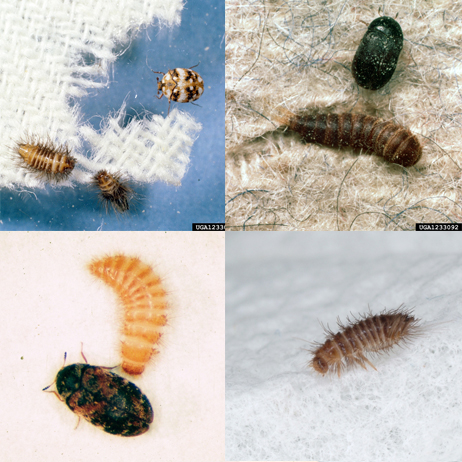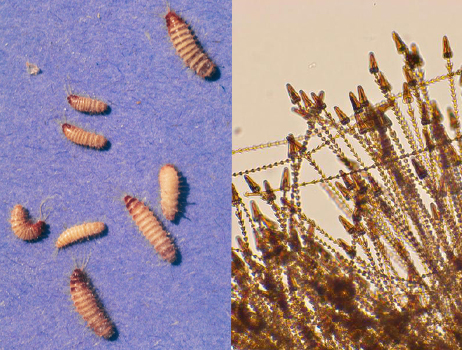Carpet Beetles
Dermestidae

Top left: Furniture beetle and Top right: Black carpet beetle (Clemson University - USDA Cooperative Extension Slide Series, Bugwood.org) Bottom left: Warehouse beetle (Whitney Cranshaw, Colorado State University, Bugwood.org) Bottom right: Carpet beetle larva (Joseph Berger, Bugwood.org)

Left: Carpet beetle larvae (Whitney Cranshaw, Colorado State University, Bugwood.org) Right: Carpet beetle larval hairs (Pest and Diseases Image Library, Bugwood.org)
Identification
- 1/16 – 1/4 inch long
- color highly variable: black to multicolored beetles
- often found in window sills
- larvae: small, hairy, tan to black; appear striped
Nesting Habits
- live indoors and outdoors
- stored foods, animal hides/materials/textiles, dead animals in voids, grain-based rodenticides, under carpeting, baseboards, and furniture, under seat cushions of upholstered furniture or anywhere hair, lint, dead insects and food crumbs collect are prime areas
- areas of minimal use such as attics, basements, cubbies, under unused or seldom moved furniture or appliances, etc., are also prime locations
Diet
- varies by species (see above)
Significance
- can damage fabrics and furniture
- can infest and destroy food items
- larval hairs can cause throat irritation if consumed
IPM Recommendations
- Locate source of beetles and remove infested items.
- Locating the source of beetles can be very difficult.
- Seal cracks around the outside foundation wall.
- Install tight-fitting door sweeps at the base of all exterior doors.
- Vacuum individuals that enter buildings.
- Store food in pest-proof containers.
- Thoroughly clean food storage and preparation areas.

